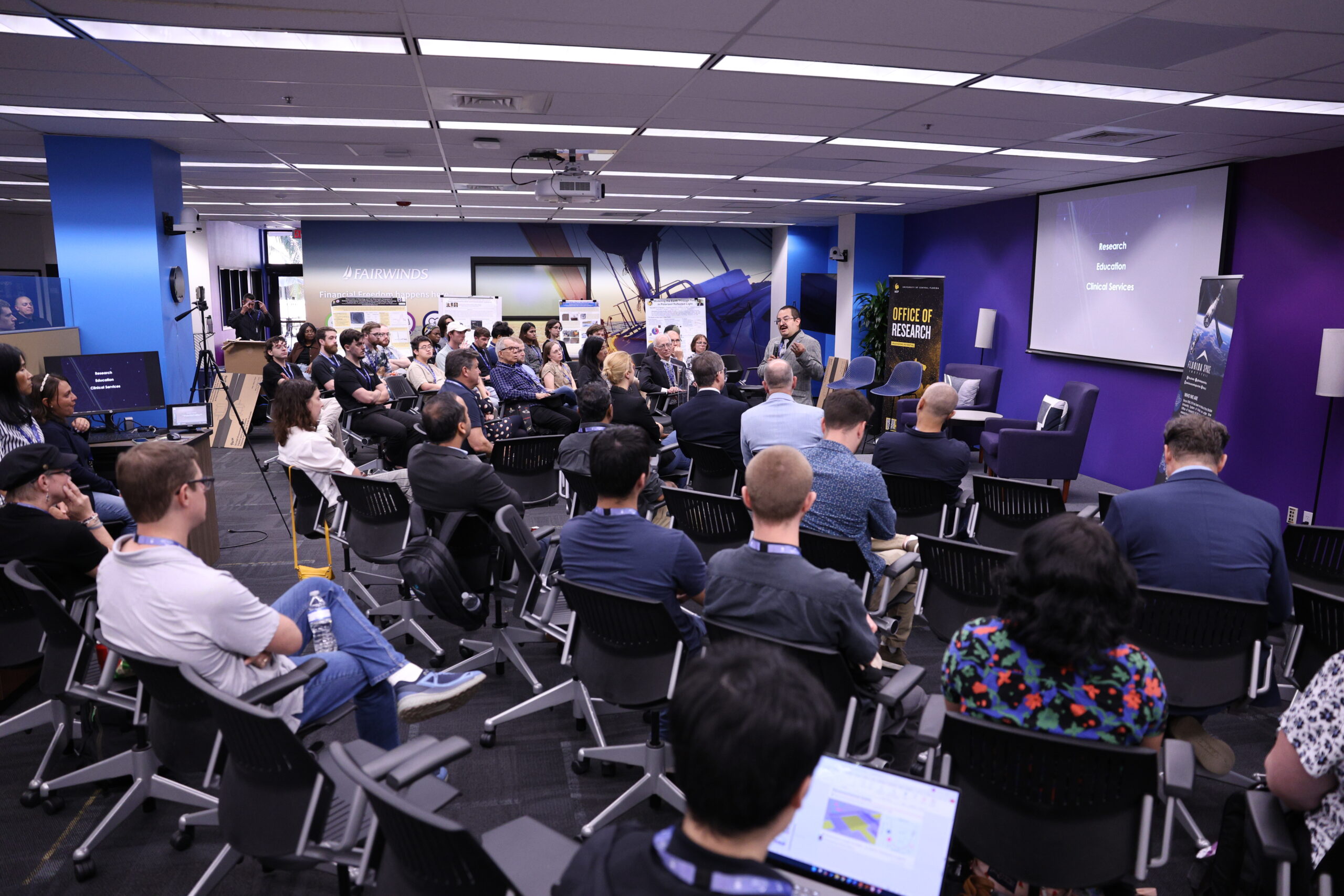Nearly 50 faculty, students and administrators shared their varied areas of space research expertise at UCF’s first SpaceU Symposium in April.
The participants highlighted UCF’s well-established legacy as SpaceU as they shared pioneering research projects and newly launched degrees in emerging fields. UCF’s College of Business, CREOL, the College of Optics and Photonics, College of Engineering and Computer Sciences, Florida Space Institute (FSI), College of Medicine, Rosen College of Hospitality Management and College of Sciences were all represented at the event.
Although coming from different areas of study, the researchers shared a common goal of advancing space innovation and propelling scientific breakthroughs. To support these endeavors, a newly formed space council with representation from across the university will continue planning comprehensive events.
“This is where it’s happening, and it’s happening now,” said Greg Autry, UCF’s Associate Provost for Space Commercialization and Strategy and key member on the space council.
Since arriving at UCF in 2024, Autry has helped to guide and bolster the university’s expanding presence as SpaceU. In his address to attendees, he noted UCF’s areas of excellence while elevating emerging space-related research topics such as space tourism, manufacturing and international space affairs.
“We’ve got a great variety of degrees here and many of them are STEM-focused, but there’s much more going on here,” Autry said, citing the rich educational offerings and research opportunities outside of STEM at UCF that are equally important. “There’s all these areas that you normally wouldn’t think of, but they’re still critical for the space enterprise. There are opportunities for research, jobs and career development.”
UCF is well-positioned to continue delivering impactful space research, having recently co-founded the newly founded Florida University Space Research Consortium. As the state’s official space research entity designated by Space Florida, the consortium will facilitate the awarding of NASA research grants in partnership with Kennedy Space Center.
The Next Generation of America’s Space University
Much progress has been made in growing UCF’s standing as a leader in space research, said Interim Associate Vice President for Research and Scholarship Joe Harrington. He noted that UCF has 75 principal investigators actively working on impactful space research, such as the Lunar-VISE mission to provide greater insight into the moon’s surface composition.
“Space is the first of the five key research areas here at UCF,” Harrington said. “Space is the one area of strength at UCF that is not just located in one college or a small group of colleges, but in fact spans the whole university as a unifying theme.”
Harrington, who is also a physics professor with a joint appointment at FSI, encouraged researchers to seek out collaborators at UCF, and to harness the vast resources that the Office of Research’s Research Development team has to offer, such as proposal writing, budgeting and outreach.
To students, he recommended scholarship and career development, citing almost 40 space-related degrees at UCF, and highlighted networking opportunities, as an estimated one-third of Kennedy Space Center employees are UCF alumni.
New Frontiers for SpaceU
The UCF space council is planning to hold another SpaceU Symposium and to invite external partners on the morning of Friday, Nov. 7, as part of UCF’s annual Space Week.
For insight into the event highlights and faculty discussion topics, here are some key areas of research.
- Manuel Rivera, assistant dean at Rosen College, explores space tourism and recreational travel that meets research “at the intersection of technology and entertainment.” His research on the public perception of space travel discusses how space tourism can become more accessible.
- Professor of Psychology Shawn Burke shared her research into team dynamics in long duration space exploration. Her lab, known as the Team Research and Adaptability in Complex Environments (TRACE) Lab, aims to better determine ideal team composition, conflict resolution and decision making in space amongst crew.
- Vice Chair for Aerospace Medicine Emanuel Urquieta joined UCF in 2024 and lends his expertise by providing medical care in remote and extreme environments. At the symposium, Urquieta detailed opportunities for growth through the forthcoming space sample processing lab, where astronaut samples will be processed, and a space medicine residency program.
- Assistant Professor Enxia Zhang represented UCF’s Department of Electrical and Computer Engineering and talked about the unique kinds of electronics and machinery that are necessary to successfully operate critical systems such as communication networks or robotics.
- Estela Fernandez-Valenzuela, FSI research associate professor, highlighted topics such as asteroid defense and resource harvesting and exploration for potentially habitable exoplanets. She discussed how planetary scientists and astronomers have made great strides in analyzing some of the outermost ancient bodies in our solar system for clues to how planets evolved and in how we may terraform Mars by regulating its surface temperature.
- Phil Metzger ’00MS ’05PhD, FSI planetary scientist and director of the Stephen W. Hawking Center for Microgravity Research and Education, shared details on how the developing center will help democratize space and inspire students to immerse themselves in space research.
UCF also will host the Space Settlement Summit on Nov. 3-4 and The Economist Space Economy Summit on Nov. 5-6.
Those interested in participating or learning more may contact Joe Harrington at jh@ucf.edu.
